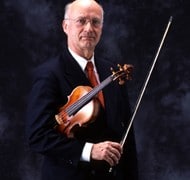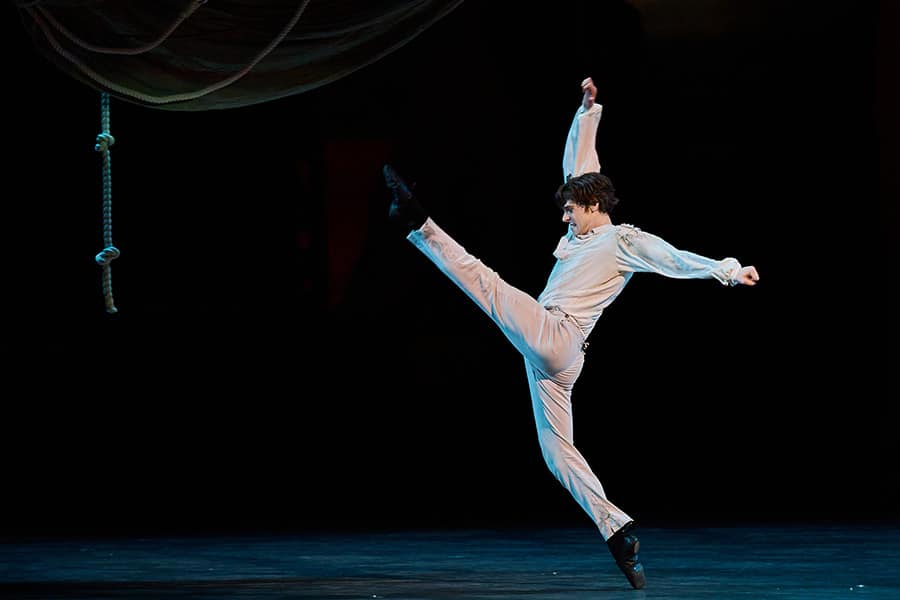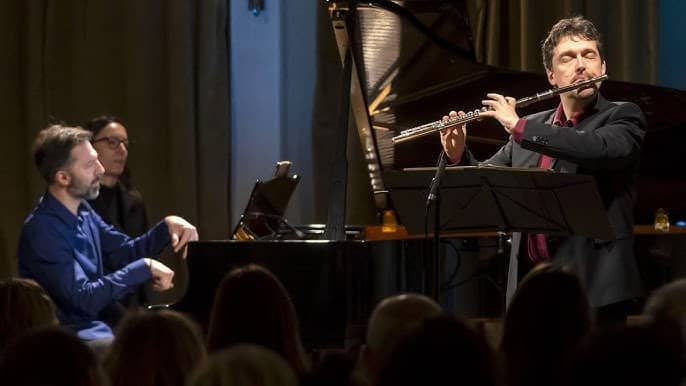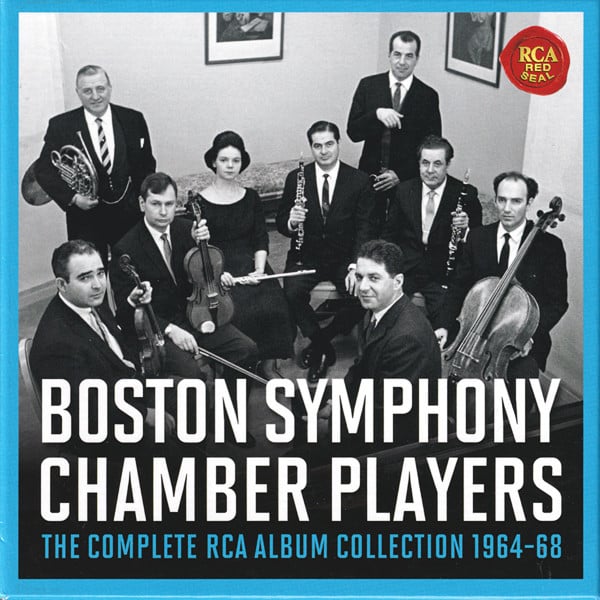Vienna Phil concertmaster: Without great composers, we’d be nothing
mainRainer Küchl reflects tenderly on 45 years in the Vienna Philharmonic first seat. Lovely, modest man who ascribes all of his success to others.

45 YEARS OF MY LIFE – RAINER KÜCHL – CONCERTMASTER VIENNA PHILHARMONIC from Wiener Philharmoniker on Vimeo.





Without great players, composers would be nothing.
Not true. They would still be composers, that’s not everything, but also not nothing.
You got to understand the musical “food chain”. Composer’s input is their own inspiration first of all. They are the original creators.
Musicians are interpreters first of all. (Improvisation in classical music is the exception, not the norm)
Musicians need input from composers to RE-create. Composers don’t need that.
Nonsense. How would their music ever be played?
Some composers can play their own music. Chopin back in the day. Hamelin or Frederick Rzeweski these days.
OK, granted, composers of solo music for instruments they themselves play can get their compositions performed without needing an additional performer, but 1) not all composers can actually play on a polished professional level, and 2) unless we’re talking about using some sort of virtual electronic means, or multitrack recording, no single composer can give a performance of music written for 2 or more instruments. It’s a symbiotic relationship. Performers need composers, composers need performers. And we all need the audience.
Composers do not need performers at all. A composition not (yet) performed is still a composition. Composers are also not contracted and paid for performances usually, but for a score.
Composers need good ideas first of all. Now performers can help to gave them, that’s where composers can get inspired by musicians. Of course sane composers also want their creations to be performed, but is is not essential to do so in order to create a musical composition.
You have to accept, that musicians are most of the time not the creators. They are the interpreters. They do need a creator (composer) to have some music to perform.
“Composers do not need performers at all”? Spoken like a composer whose music doesn’t get played much. Possibly for good reason.
More pressing is the observation that nowadays we have the best possible players / orchestras, and as we know the VPO belongs to the world top, but no great composers. Whatever greatness in music is available, is – in a literal sense – old. But in a musical sense, the old great composers are contemporary for ever, in spite of the regular populist attacks and the erosion of Bildung among populations in the West. Probably their imposing, continuing contemporary presence creates a competition too hard to beat and too intimidating to emulate. This inspires reactions like the following:
http://www.youtube.com/watch?v=jwlCD2y2tBA
Yes, There are three components of music, the composer, the interpreter (artist, conductor) and me, the audience. One composer, many artists and millions of listeners. None is more important than the other. I feel to be part of the action as only a listener.
Graham, a composer’s music doesn’t necessarily have to be played in order to 1) exist and 2) be perceived by others as music.
Of course the proof of the pudding is still in the eating, also in music, meaning actual performance, but in the inner circle of musicians and composers, much can be perceived and even heard (with the inner ear) by just looking into the score.
A composer doesn’t need the musicians to compose. (even though it helps to hear your own music performed and learn from that)
A musician on the other hand can not have a meaningful work life without composers. Particularly not orchestra musicians.
More nonsense. Unless played it might as well not exist, like an unseen painting.
As someone who obviously thinks in a small box, you should try to be less full of yourself.
An unseen painting? Impossible. Think about it and you find the solution to your misconception.
And cue William Osborne’s pavlovian rant about women and Asians in the Vienna Philharmonic…
Rainer Küchl is such a great musician. I still have in my ears the final bars of Rosenkavalier’s first act with the solo violin conducted by Carlos Kleiber at the Staatsoper in March 1994. Time literally stopped…
Rainer Kuechl and Glenn Dicterow were my favourite concertmasters!
Yes, and I would add the late Joseph Silverstein of the Boston Symphony, Rafael Druian and Bill Preucil, both of the Cleveland Orchestra
Modest indeed. I always appreciate great artists who never forget the factor “luck”. Thanks for posting this, Norman.
Amen! A real “Mensch” is aware, that he might be especially capable, but that there are usually also others, who are as capable or even better than oneself, and that the difference between success and failure often simply is a iota of luck that moves the scale down on your side.
Kuechl (with hair) is the concertmaster in Lenny’s VPO videos.
The concertmaster in most of “Lenny’s” VPO videos was Gerhart Hetzel.
Indeed I agree that Herr Küchl is a ‘class act’ …. and his sincere humility is meritorious. Congratulations, Herr Küchl and may you forever thrive! Thank you for blessing our lives with 45 years of your very best.
Saw him lead at the Staatsoper in Capriccio one Saturday evening, where he played the violin solo, then lead again on Sunday morning at the Musikverein
What a performer!
And what a charmer, with his lilting Viennese accent
Meister Küche, thank you for your outstanding service to music and your orchestra, words usually fail to encompass all the achievements of your work life.
And Vienna Phil, who accepted that video clip from this apparent idiotic production company? Whoever thinks it is a good idea to put such generic elevator music under a clip where the concertmaster of the Vienna Phil is giving the resume of his career, that person ought to be punished with watching André Riéu videos in eternity.
Seriously, when the concert master is talking, then he is talking. No music required.
Retards.
This is entirely true. The background music is excruciating.
Great and touching video, and a great musician. To say so much in so few words.
Peter,bravo!
The punishment of watching Rieu videos for life is brilliant!!!!!!!!!
Give it time, Osborne will enlighten us soon no doubt.
I agree that the background music is completely superfluous: to add insult to injury, it was not even orchestral music, and bore no relation whatsoever to the clips of the orchestra in action (such clips having been shorn of their soundtracks… why?). No music during the talking and the actual music being played during the clips of the orchestra would have been far, far better.
I am perturbed that some of the comments above distinguish between “composer” and “musician”. This aberration of American English distorts our understanding of practitioners of classical music, and must be eliminated from contemporary discourse, for a composer *is* a musician, and so is a performer. As some have already observed, many musicians both compose and perform, which is, in my view, a good thing: indeed, I would argue that it is overspecialisation that has blighted classical music in the last half-century or so. Much of the problem can be summarised in Peter’s aside that “Improvisation in classical music is the exception, not the norm”. No notated music, not even that of Schoenberg and Ferneyhough, captures *every* detail of performance, so all performing is a creative and interpretative act (and why performances of the same composition can *legitimately* — even when taking a narrow definition of legitimacy as being wholly circumscribed by the notation and, to the extent that it is possible to ascertain it, how the notation was applied and understood in practice by its composer — sound very different). Detailed notation does not imply any less creativity on the part of performers (cf. Stravinsky on obstacles and how they make his creative freedom all the more meaningful).
Returning to Küchl’s comments, I think he strikes an apposite tone in speaking of the importance of performers not being egotistical in interpreting compositions, and I do think it a timely reminder. In the context of his comments on working with many different conductors and colleagues, I think it clear that Küchl is not endorsing a simplistic “food chain” model of music-making. Nonetheless, we must be very careful not to fall into the trap of imposing misappropriated notions of “authenticity” as a substitute for musical intelligence (this is not to criticise HIP; it is to criticise unintelligent applications of historical source-material that purport to be HIP).
Great statement. My “food chain” comment was not meant to fully describe the model of music-making but to provoke thought of the chain of events necessary in music making. Undoubtedly first comes the musical idea as the initial and mandatory spark.
There are several thought models to describe music making, all of them of course limited in theory.
What I oppose, is the circular, economic model (composer, interpreter and audience all equally important) to be applied to the creative model, where we have more of a spiral model, where the uplifting force that makes the difference between the circle and the spiral is the creativity of the musical idea, and that’s something mostly the composer contributes.
Actually one major problem of the intellectually somewhat stagnant classical music today is its lack of that uplifting force and thus we go in circles… even though on a very high level…
What a lovely testament.
Re some of the subsequent discussion: for those who are not familiar with it, Roger Sessions wrote a book on point concerning the relationship among the roles of composer, performer, and (please don’t forget) listener. Logically enough, it is entitled:
“The Musical Experience of Composer, Performer, Listener.”